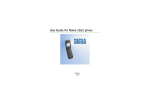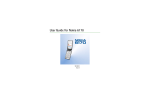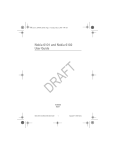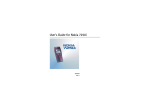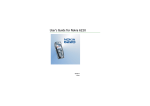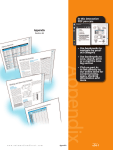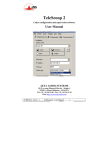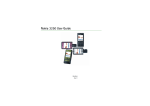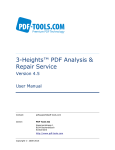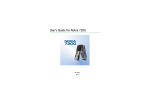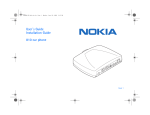Download User`s Guide for Nokia 3120
Transcript
User’s Guide for Nokia 3120 DECLARATION OF CONFORMITY We, NOKIA CORPORATION declare under our sole responsibility that the product RH-19 is in conformity with the provisions of the following Council Directive: 1999/5/EC. A copy of the Declaration of Conformity can be found from http://www.nokia.com/phones/declaration_of_conformity/. Copyright © 2004 Nokia. All rights reserved. Reproduction, transfer, distribution or storage of part or all of the contents in this document in any form without the prior written permission of Nokia is prohibited. Nokia, Nokia Connecting People, Xpress-on and Pop-Port are trademarks or registered trademarks of Nokia Corporation. Other product and company names mentioned herein may be trademarks or tradenames of their respective owners. Nokia tune is a sound mark of Nokia Corporation. US Patent No 5818437 and other pending patents. T9 text input software Copyright (C) 1997-2004. Tegic Communications, Inc. All rights reserved. Includes RSA BSAFE cryptographic or security protocol software from RSA Security. Java is a trademark of Sun Microsystems, Inc. Nokia operates a policy of continuous development. Nokia reserves the right to make changes and improvements to any of the products described in this document without prior notice. Under no circumstances shall Nokia be responsible for any loss of data or income or any special, incidental, consequential or indirect damages howsoever caused. The contents of this document are provided "as is". Except as required by applicable law, no warranties of any kind, either express or implied, including, but not limited to, the implied warranties of merchantability and fitness for a particular purpose, are made in relation to the accuracy, reliability or contents of this document. Nokia reserves the right to revise this document or withdraw it at any time without prior notice. The availability of particular products may vary by region. Please check with the Nokia dealer nearest to you. Please dispose of batteries properly. Issue 1 Copyright © 2004 Nokia. All rights reserved. i Contents FOR YOUR SAFETY..................... iv Writing text........................................ 8 Network Services ..........................v Setting predictive text input on or off.......................................................... 8 Using predictive text input ................. 9 Using traditional text input ............. 10 About accessories .........................v General information .................. vi Access codes ..................................... vi Extended user’s guide..................... vi Overview of the functions in the phone.............................. vii Shared memory ............................... vii 1. Your phone ............................. 1 Keys and connectors........................ 1 Standby mode.................................... 1 Power saving ........................................... 2 Essential indicators ............................... 2 2. Getting started ....................... Installing the SIM card and the battery ................................................. Charging the battery ....................... Switching the phone on and off .. Normal operating position............. Keypad lock (Keyguard)................... Changing the front and back cover........................................... 3 3 4 4 4 5 5 3. Basic functions ....................... 7 Making a call ..................................... 7 Speed dialling a phone number......... 7 Answering or rejecting an incoming call ..................................... 7 Call waiting ............................................. 8 Options during a call ....................... 8 Loudspeaker............................................. 8 ii 4. Using the menu.................... 11 List of menu functions.................. 11 Messages (Menu 1)........................ 13 Text messages ...................................... Multimedia messages ........................ Multimedia messages memory full ........................................................... Deleting messages .............................. Voice messages.................................... Info messages ...................................... Message settings................................. Service commands.............................. 13 16 18 18 19 19 19 20 Call register (Menu 2) ................... 20 Recent call lists ................................... 20 Call counters and call timers........... 21 Contacts (Menu 3) ......................... 21 Searching for a name in contacts.. 21 Saving multiple numbers, text items and an image per contact ................ 22 Profiles (Menu 4) ............................ 23 Settings (Menu 5)........................... 23 Personal shortcuts .............................. Screen saver ......................................... Time and date settings ...................... Call settings.......................................... Phone settings ..................................... Display settings ................................... Tone settings ........................................ Enhancement settings ....................... Security settings.................................. Restore factory settings.................... Copyright © 2004 Nokia. All rights reserved. 23 23 24 24 25 26 26 27 27 28 Alarm clock (Menu 6) .................... 28 Gallery (Menu 7) ............................. 28 Calendar (Menu 8).......................... 29 Making a calendar note ..................... 29 When the phone alarms for a note ...................................................... 30 Games (Menu 9).............................. 30 Launching a game ............................... 30 Game downloads.................................. 30 Game settings ....................................... 30 Applications (Menu 10) ................ 31 Launching an application .................. 31 Downloading an application............. 31 Extras (Menu 11) ............................ 32 Calculator............................................... 32 Countdown timer................................. 33 Stopwatch.............................................. 33 Services (Menu 12)......................... 34 5. PC Connectivity.................... 40 PC Suite............................................. 40 6. Battery statements............... 41 Charging and Discharging ........... 41 7. Genuine Enhancements ....... 42 Battery............................................... 42 Indoor................................................. 42 Standard Charger (ACP-7)................ 42 Travel Charger (ACP-12) ................... 43 Indoor and Vehicle ......................... 43 Boom Headset (HDB-4)..................... 43 8. Care and Maintenance......... 44 9. Important Safety Information............................... 45 Index........................................... 49 Setting up the phone for a service.................................................. 34 Making a connection to a service... 35 Browsing the pages of a service...... 35 Disconnect from a service ................. 36 Appearance settings of the multimode browser ....................................... 36 Selecting Cookie settings .................. 36 Bookmarks.............................................. 37 Downloading ......................................... 37 Service inbox......................................... 37 Clearing the cache memory.............. 38 Authority certificates.......................... 38 Go to (Menu 13).............................. 39 SIM services (Menu 14) ................ 39 Copyright © 2004 Nokia. All rights reserved. iii FOR YOUR SAFETY Read these simple guidelines. Breaking the rules may be dangerous or illegal. Further detailed information is given in this manual. Only qualified personnel may install or repair phone equipment. Do not switch on the phone when wireless phone use is prohibited or when it may cause interference or danger. ACCESSORIES AND BATTERIES ROAD SAFETY COMES FIRST WATER-RESISTANCE Do not use a hand-held phone while driving. Your phone is not waterresistant. Keep it dry. INTERFERENCE BACKUP COPIES All wireless phones may get interference, which could affect performance. Remember to make backup copies of all important data. SWITCH OFF IN HOSPITALS Follow any regulations or rules. Switch the phone off near medical equipment. SWITCH OFF IN AIRCRAFT Wireless devices can cause interference in aircraft. SWITCH OFF WHEN REFUELLING Do not use the phone at a refuelling point. Do not use near fuel or chemicals. SWITCH OFF NEAR BLASTING Do not use the phone where blasting is in progress. Observe restrictions, and follow any regulations or rules. USE SENSIBLY Use only in the normal position. Do not touch the antenna unnecessarily. iv QUALIFIED SERVICE Use only approved accessories and batteries. Do not connect incompatible products. CONNECTING TO OTHER DEVICES When connecting to any other device, read its user's guide for detailed safety instructions. Do not connect incompatible products. CALLING Ensure the phone is switched on and in service. Enter the phone number, including the area code, then press . To end a call, press . To answer a call, press . EMERGENCY CALLS Ensure the phone is switched on and in service. Press as many times as needed (e.g. to exit a call, to exit a menu, etc.) to clear the display. Enter the emergency number, then press . Give your location. Do not end the call until told to do so. Copyright © 2004 Nokia. All rights reserved. Network Services The wireless phone described in this guide is approved for use on the EGSM 900, GSM 1800 and GSM 1900 network. Triband is a network dependent feature. Check with your local service provider if you can subscribe to and use this feature. A number of features included in this guide are called Network Services. These are special services that you arrange through your wireless service provider. Before you can take advantage of any of these Network Services, you must subscribe to them through your service provider and obtain instructions for their use from your service provider. Note: Some networks may not support all language-dependent characters and/or services. About accessories Check the model number of any charger before use with this device. This device is intended for use when supplied with power from ACP-7, ACP-12 and LCH-12. Warning: Use only batteries, chargers and accessories approved by the phone manufacturer for use with this particular phone model. The use of any other types may invalidate any approval or warranty applying to the phone, and may be dangerous. For availability of approved accessories, please check with your dealer. When you disconnect the power cord of any accessory, grasp and pull the plug, not the cord. Copyright © 2004 Nokia. All rights reserved. v General information ■ Access codes • Security code: This code, supplied with the phone, protects your phone against unauthorised use. The preset code is 12345. Refer to ”Security settings” on page 27 to see how it works. • PIN code: This code, supplied with the SIM card, protects the card against unauthorised use. Set on the PIN code request in the Security settings menu (see ”Security settings” on page 27), so that the code is requested each time the phone is switched on. If you key in an incorrect PIN code three times in succession, the SIM card is blocked. You must key in the PUK code to unblock the SIM card and set a new PIN code. • PIN2 code: This code is supplied with some SIM cards and is required to access certain services, such as charging unit counters. If you key in an incorrect PIN2 code three times in succession, PIN2 code blocked appears on the display, and you will be asked for the PUK2 code. vi Change the security code, PIN code and PIN2 code in Change of access codes in the Security settings menu (see ”Security settings” on page 27). Keep the new codes secret and in a safe place separate from your phone. • PUK and PUK2 code: These codes may be supplied with the SIM card. If this is not the case, contact your local service provider. • Barring password (4 digits): The barring password is needed when using the Call barring service, see ”Security settings” on page 27. You can obtain the password from your service provider. ■ Extended user’s guide You may find an extended user’s guide for your phone model in the support area on the Nokia’s web site, www.nokia.com. Copyright © 2004 Nokia. All rights reserved. Overview of the functions in the phone The Nokia 3120 phone provides many functions which are practical for daily use, such as Calendar, Clock, Alarm clock, Profiles, and many more. Some functions are • MMS - Multimedia Messaging Service, see ”Multimedia messages” on page 16. • Polyphonic MIDI ringing tones enable richer ringing tones with a wide variety of sounds. • GPRS - General Packet Radio Service is used for sending and receiving data over the mobile network. • MIDP Java™ applications specially designed for mobile phones. See ”Applications (Menu 10)” on page 31. ■ Shared memory The following features in this phone share memory: phone’s contacts directory, text and multimedia messages, images and ringing tones in gallery, calendar, bookmarks, and Java games and applications. Using any such features may reduce the memory available for any features sharing memory. This is especially true with heavy use of any of the features. For example, saving many images, Java applications, etc. may take all of the shared memory and your phone may display a message that the memory is full. In this case, delete some of the applications or entries stored in the shared memory features before continuing. • Nokia OTA settings service. Several services need proper settings in your phone. You may receive the settings directly as an OTA (Over The Air) message and you only need to save the settings. Contact your nearest authorised Nokia dealer for more information. Copyright © 2004 Nokia. All rights reserved. vii viii Copyright © 2004 Nokia. All rights reserved. Your phone 1. Your phone ■ Keys and connectors 1. Power key 6. characters. enter numbers and and are used for various purposes in different functions. 7. Charger connector 8. Pop-PortTM connector for headset and data cable, for example ■ Standby mode When the phone is ready for use, and you have not keyed in any characters, the phone is in standby mode. 1. Indicates the operator logo. 2. Selection keys and 3. 4-way scroll key with , , and , and adjusts the volume. 4. 5. dials a phone number, and answers a call. In standby mode it shows the most recently called numbers. 2. Shows the signal strength of the cellular network at your current location. 3. Shows the battery charge level. 4. The left selection key in standby mode is Menu. ends an active call. Exits from any function. Copyright © 2004 Nokia. All rights reserved. 1 Your phone 5. The right selection key in standby mode is Contacts or Go to (personal shortcut). To set the functions for your personal shortcut, see ”Personal shortcuts” on page 23. Power saving For power saving a digital clock view overwrites the display when no function of the phone has been used for a certain period of time. Essential indicators You have received one or several text or picture messages. See ”Reading and replying to a message or a SMS e-mail” on page 15. You have received one or several multimedia messages. See ”Reading and replying to a multimedia message” on page 18. 2 The phone’s keypad is locked. See ”Keypad lock (Keyguard)” on page 5. The phone does not ring at an incoming call or text message when Incoming call alert is set to Off and Message alert tone is set to Off. See ”Tone settings” on page 26. The alarm clock is set to On. See ”Alarm clock (Menu 6)” on page 28. All your calls are diverted to another number, Divert all voice calls. If you have two phone lines, the divert indicator for the first line is and for the second line . See ”Call divert” on page 24. The loudspeaker has been activated. See ”Loudspeaker” on page 8. The phone has registered a missed call. See ”Call register (Menu 2)” on page 20. Copyright © 2004 Nokia. All rights reserved. Getting started 2. Getting started ■ Installing the SIM card and the battery Keep all miniature SIM cards out of the reach of small children. • The SIM card and its contacts can easily be damaged by scratches or bending, so be careful when handling, inserting or removing the card. • Before installing the SIM card, always make sure that the phone is switched off and disconnected from any enhancement. 1. Remove the back cover from the phone. With the back of the phone facing you, push the back cover release button (1) and slide the back cover off (2). 2. Release the SIM card holder. Gently pull the locking clip of the card holder (4) and open it (5). 3. Insert the SIM card into the SIM card holder (6). Make sure that the SIM card is properly inserted and that the golden contact area on the card is positioned as shown. Remove the battery by lifting it with the finger grip (3). 4. Close the SIM card holder (7) and press it until it snaps into position. Copyright © 2004 Nokia. All rights reserved. 3 Getting started 5. Insert the battery (8). ■ Switching the phone on and off Warning: Do not switch the phone on when wireless phone use is prohibited or when it may cause interference or danger. 6. Slide the back cover into its place (9). ■ Charging the battery 1. Connect the lead from the charger to the socket on the bottom of your phone. Press and hold the power key . If the phone asks for a PIN code, key in the PIN code (displayed as ****). ■ Normal operating position Use the phone only in its normal operating position. 2. Connect the charger to an AC wall socket. The text Charging is displayed briefly if the phone is switched on. If the battery is completely empty, it may take a few minutes before the charging indicator appears on the display or any calls can be made. The charging time depends on the charger and the battery used. For example, charging a BR-5C battery with the ACP-7 charger takes up to 3 hours in standby mode while charging with the ACP-12 charger takes up to 1.5 hours in standby mode. 4 Your phone has a built-in antenna. As with any other radio transmitting device, do not touch the antenna unnecessarily when the phone is switched on. Contact with the antenna affects call quality and may cause the phone to operate at a higher power level than otherwise needed. Not touching the antenna area during a phone call optimises the antenna performance and the talktime of your phone. Copyright © 2004 Nokia. All rights reserved. Getting started ■ Keypad lock (Keyguard) You can lock the keypad to prevent the keys being accidentally pressed. 1. Remove the back cover of the phone. Press (Menu or Unlock) and then within 1.5 seconds to lock or unlock the keypad. An incoming call can be handled normally. When you end or reject the call, the keypad will automatically be locked again. For automatic keypad lock, see ”Automatic keyguard” on page 25. Note: When the keypad is locked, calls may be possible to the emergency number programmed into your phone (e.g. 112, 911 or other official emergency number). Key in the emergency number and press . The number is displayed only after you have keyed in its last digit. ■ Changing the front and back cover With the back of the phone facing you, push the back cover release button (1) and slide the back cover off (2). 2. To remove the front cover, gently prise the back part of the phone away from the front cover beginning at the bottom of the phone. 3. Insert the key mat on the new front cover. Before changing the covers, always switch off the power and disconnect the phone from the charger or any other device. Avoid touching electronic components while changing covers. Always store and use the phone with the covers attached. Copyright © 2004 Nokia. All rights reserved. 5 Getting started 4. To attach the front cover, first place the phone and the front cover properly together and then gently push on the top of the phone until the catch is locked properly. 5. Place the back cover and the phone properly together (1) and slide the back cover into its place (2) until the back cover release button is properly locked. 6 Copyright © 2004 Nokia. All rights reserved. Basic functions 3. Basic functions ■ Making a call 1. Key in the phone number, including the area code. If you key in a wrong character, press Clear to delete it. For international calls, press twice for the international prefix (the + character replaces the international access code) and then key in the country code, area code without the leading 0, if necessary, and the phone number. 2. Press to call the number. 3. Press to end the call or to cancel the call attempt. Making a call using the contacts list In standby mode, press or to find the name or key in the first character(s) of the name you are looking for. See also ”Searching for a name in contacts” on page 21. Press to call the number on the display. Last number redialling In standby mode, press once to access the list of up to 20 numbers you last called or attempted to call. Scroll to the number or name you want, and press to call the number. Speed dialling a phone number Assign a phone number to one of the speed dialling keys, from to , see menu option Speed dials in chapter ”Contacts (Menu 3)” on page 21. Call the number in either of the following ways: • Press the speed dialling key you want and then press . • If Speed dialling is set to on, press and hold a speed dialling key until the call is started. See ”Speed dialling” on page 24. ■ Answering or rejecting an incoming call Press to answer the incoming call and press to end the call. Press to reject the incoming call. Press Silence, if available, to mute the ringing tone. Then either answer or reject the call. Tip: If the Divert if busy function is activated to divert the calls, for example to your voice mailbox, rejecting an incoming call will also divert the call. See ”Call divert” on page 24. Copyright © 2004 Nokia. All rights reserved. 7 Basic functions Call waiting During a call, press to answer the waiting call. The first call is put on hold. Press to end the active call. To activate the Call waiting function, see ”Call waiting” on page 25. ■ Options during a call Many of the options that you can use during a call, are network services. Press Options during a call for some of the following options: End call, End all calls, Mute, Unmute, Contacts, Menu, Hold, Unhold, Swap, Transfer, New call, Conference, Private, Answer, Reject, Send DTMF, Loudspeaker, Handset, Lock keypad. For more information, see the extended user’s guide for your phone model in the support area on the Nokia’s web site, www.nokia.com. To activate the loudspeaker, press Options and select Loudspeaker, or press selection key Loudsp., if available. To deactivate the loudspeaker during a call, press Options and select Handset, or press selection key Handset, if available. ■ Writing text You can key in text in two different ways, using the traditional text input, indicated with , or using the predictive text input indicated with at the top left of the display. The character case is indicated by , , or next to the text input indicator. You can change the character case by pressing . The number mode is indicated by , and you can change between the letter and number mode by pressing and holding . Loudspeaker You can use the integrated loudspeaker during a call to have the handsfree function of the phone. Warning: Do not hold the phone near to your ear when the loudspeaker is in use, because the volume may be extremely loud. 8 Setting predictive text input on or off When writing text, press Options and select Dictionary. • To set the predictive text input on, select a language in the dictionary options list. • To change back to the traditional text input, select Dictionary off. Copyright © 2004 Nokia. All rights reserved. Basic functions Tip: To quickly set the predictive text input on or off when writing text, press twice, or press and hold Options. Using predictive text input Predictive text input is an easy way to write text. The predictive text input is based on a built-in dictionary to which you can also add new words. 1. Key in the word you want by pressing each key once for one letter. The word changes after each keystroke. For example, to write ‘Nokia’ when the English dictionary is selected, press , , , , . • To delete the character to the left of the cursor, press Clear. Press and hold Clear to delete the characters more quickly. • To switch between upper and lower cases, or between traditional and predictive text input, press repeatedly and check the indicator at the top of the display. • To insert a number, press and hold the desired key. To switch between letters and numbers, press and hold . • To get some punctuation marks, press repeatedly. • To get a list of special characters, press and hold , select the character you want, or press again to select a smiley from the offered list. Press Use to insert a special character or a smiley. 2. If the displayed word is the one you want, press and start writing the next word. • If you want to change the word, press repeatedly to the word you want. • If the "?" is displayed after the word, the word is not in the dictionary. To add the word to the dictionary, press Spell, key in the word (traditional text input is used) and press OK. Writing compound words Key in the first half of the word, press , and then key in the second half. Copyright © 2004 Nokia. All rights reserved. 9 Basic functions Using traditional text input Press the key marked with the letter that you want repeatedly until the letter appears. Use the following functions to edit the text: • To add a space, press . • To add a punctuation mark or special character, press repeatedly, or press , select the desired character, and press Use. • To add a smiley, press twice and select the desired smiley, and press Use. • To move the cursor to the left, right, down or up, press the scroll keys , , or , respectively. • To delete a character to the left of the cursor, press Clear. Press and hold Clear to delete the characters more quickly. • To switch between upper and lower case, press . • To add a number, press and hold the desired key. To switch between letters and numbers, press and hold . • To key in a letter which is on the same key as the previous one, press or (or wait until the cursor appears), and key in the new letter. 10 Copyright © 2004 Nokia. All rights reserved. Using the menu 4. Using the menu The phone offers you an extensive range of functions which are grouped in menus. pressing Select. Select submenus and settings of your choise in the same way. To access the menu, press Menu. Scroll with or through the menus and select the menu by Press Back to return to the previous menu level, and Exit to exit the menu. ■ List of menu functions 1. Messages 1. Text messages 2. Multimedia msgs. 3. Voice messages 4. Info messages 5. Message settings 6. Service commands 2. Call register 1. Missed calls 2. Received calls 3. Dialled numbers 4. Delete recent call lists 5. Call duration 6. Call costs 7. GPRS data counter 8. GPRS connection timer 3. Contacts 1. Search 2. Add contact 3. Delete 4. Copy 5. Settings 6. Speed dials 7. Info numbers1 8. Service numbers1 9. My numbers2 10.Caller groups2 4. Profiles 1. General 2. Silent 3. Discreet 4. Loud 5. My Style 1 6. My Style 2 1. Only shown if supported by your SIM card. 2. If Info numbers, Service numbers or both are not supported, the numbers of this menu item changes accordingly. Copyright © 2004 Nokia. All rights reserved. 11 Using the menu 5. Settings 1. Personal shortcuts 2. Screen saver 3. Time and date settings 4. Call settings 5. Phone settings 6. Display settings 7. Tone settings 8. Enhancement settings1 9. Security settings 10.Restore factory settings 6. Alarm clock 1. Alarm time 2. Alarm tone 7. Gallery 1. View folders 2. Add folder 3. Delete folder 4. Rename folder 5. Gallery downloads 8. Calendar 9. Games 1. Select game 2. Game downloads 3. Memory 4. Settings 10.Applications 1. Select application 2. App. downloads 3. Memory 11.Extras 1. Calculator 2. Countdown timer 3. Stopwatch 12.Services 1. Home 2. Bookmarks 3. Download links 4. Service inbox 5. Settings 6. Go to address 7. Clear the cache 13.Go to 14.SIM services2 1. This menu is shown only if the phone is or has been connected to a compatible headset, handsfree unit or loopset available for the phone. 2. Only shown if supported by your SIM card. The name and contents vary depending on the SIM card. 12 Copyright © 2004 Nokia. All rights reserved. Using the menu ■ Messages (Menu 1) Writing and sending messages You can read, write, send and save text, multimedia, and e-mail messages. Before sending a message, you need to save your message centre number, see ”Message settings” on page 19. Text messages Using SMS (Short Message Service), your phone can send and receive multi-part messages, which consist of several ordinary text messages (network service). Invoicing may be based on the number of parts needed for your message. If you use special (Unicode) characters, more parts may be needed for the message than otherwise. Note that predictive text input may use Unicode characters. You can also send and receive text messages that contain pictures. Note: Picture message function can be used only if it is supported by your network operator or service provider. Only phones that offer picture message features can receive and display picture messages. The number of available characters / the current part number of a multipart message are shown on the top right of the display, for example 120/2. 1. Press Menu, and select Messages, Text messages and Create message. 2. Key in a message. See ”Writing text” on page 8. Following options may be available: Use template, Insert picture, Insert smiley, Insert number. Each picture message is made up of several text messages. Therefore, sending one picture message may cost more than sending one text message. 3. To send the message, press Options and select Send. 4. Key in the recipient’s phone number or search for a phone number in Contacts. Press OK to send the message. Copyright © 2004 Nokia. All rights reserved. 13 Using the menu Note: When sending messages via the SMS network service, your phone may display the words Message sent. This is an indication that the message has been sent by your phone to the message centre number programmed into your phone. This is not an indication that the message has been received at the intended destination. For more details about SMS services, check with your service provider. Options for sending a message After you have written a message, press Options and select Sending options: With Send to many you can send the message to several recipients and Send to list sends the message to a predefined distribution list. ”Distribution lists” see on page 16. With Sending profile you can use a predefined message profile to send the message. For the message profile, see ”Message settings” on page 19. 14 Writing and sending a SMS e-mail Before you can send any e-mails via SMS you need to save the settings for e-mail sending, see ”Message settings” on page 19. To check e-mail service availability and to subscribe to the service, contact your service provider. To save an e-mail address in the contacts list, see ”Saving multiple numbers, text items and an image per contact” on page 22. 1. Press Menu, and select Messages, Text messages and Create SMS e-mail. 2. Key in the recipient’s e-mail address or search for it in the contacts list, key in the subject and the e-mail message. 3. To send the e-mail, press Options and select Send e-mail. Note: When sending e-mails via the SMS network service, your phone may display the words Message sent. This is an indication that the e-mail has been sent by your phone to the e-mail server. This is not an indication that the e-mail has been received at the intended destination. For more details about e-mail services, check with your service provider. Copyright © 2004 Nokia. All rights reserved. Using the menu Reading and replying to a message or a SMS e-mail When you have received a message or an e-mail, the indicator and the number of new messages followed by ... messages received is shown. Received messages are automatically stored in shared memory. The blinking indicates that the message memory is full. Before you can receive new messages, delete old messages. 1. Press Show to view the message, or press Exit to view it later. If more than one message is received, select the message you want to read. An unread text message is indicated by in front of it. 2. While reading or viewing the message, press Options. You can select, for example, an option to delete, forward or edit the message as a text message or an e-mail, move and rename the message you are reading. With Copy to calendar you can copy the text from the beginning of the message to your phone’s calendar as a reminder note. Select Message details to view the sender’s name and phone number, the message centre used, reception date and time. Select Use detail to extract numbers, e-mail addresses and website addresses from the current message. When reading a picture message, select Save picture to save the picture in the Templates folder. 3. Select Reply to reply to a message. Select Empty screen, Original text or select a standard answer to be included in the reply. Confirm or edit e-mail address and subject. Write your reply message. Press Options, select Send, and press OK to send the message to the displayed number. Inbox and outbox folders The phone saves the incoming text messages in the Inbox folder and the sent messages in the Sent items folder of the Text messages submenu. The text messages you want to send later, can be saved in the Archive, My folders or Templates folder. Templates Your phone offers you text templates , and picture templates . To access the template list, press Menu, and select Messages, Text messages and Templates. Copyright © 2004 Nokia. All rights reserved. 15 Using the menu Archive folder and my folders You can organise your messages in the Archive folder or in new added folders. While reading a message, press Options. Select Move, scroll to the folder where you want to move the message and press OK. To add or delete a folder, press Menu, and select Messages, Text messages and My folders. Press Options and select Add folder or Delete folder. Distribution lists If you often need to send messages to a fixed group of recipients, you can define distribution lists in the phone’s directory. To view the names in the selected distribution list, press Menu, and select Messages, Text messages and Distribution lists. Press Options and select View list. Press Options again to edit the content of a distribution list: Add contact, View details or Delete contact. To edit the distribution lists, press Menu, and select Messages, Text messages and Distribution lists. Press Options and select Add list, Rename list, Clear list or Delete list. 16 If a message cannot be sent to certain recipients on the distribution list, select Undelivered. Press Options and select Resend to list (to resend the message to the recipients on the Undelivered list), View list, Delete list or View message. Message counters To view your message counters, press Menu, and select Messages, Text messages, Message counter and Sent messages or Received messages. To clear the counters select Clear counters. Multimedia messages Note: This function can be used only if it is supported by your network operator or service provider. Only phones that offer multimedia message features can receive and display multimedia messages. A multimedia message can contain text, picture and sound. The phone supports multimedia messages of size up to 45 kB. Note: If Allow multimedia reception is set to Yes or In home network, your operator or service provider may charge you for every message you receive. Copyright © 2004 Nokia. All rights reserved. Using the menu Multimedia messaging supports the following formats: • Picture: JPEG, GIF, PNG, and BMP. • Sound: Scalable Polyphonic MIDI (SP-MIDI) and monophonic ringing tones. You are not able to receive any multimedia messages if you have a call in progress, a game or another Java application running, or an active service connection. Because delivery of multimedia messages can fail for a variety of reasons, do not rely solely upon them for essential communications. Writing and sending a multimedia message To set the settings needed, see ”Settings for the multimedia messages” on page 19. For availability and subscription to the multimedia messaging service, contact your service provider. 1. Press Menu, and select Messages, Multimedia msgs. and Create message. 2. Key in a message. To insert a picture or a sound clip from Gallery, press Options, and select Insert image or Insert sound clip. The list of available folders in the Gallery is shown. Open a specific folder, scroll to the desired picture or sound, press Options and select Insert. The or indicator on the header of the message indicate that a picture or sound has been attached. To key in a name from the contacts list, press Options and select More options and Insert contact. To insert a number, press Options and select More options and Insert number. To view the message before sending it, press Options and select Preview. 3. To send the message, press Options and select Send to number (or Send to e-mail or Send to many). 4. Key in the recipient’s phone number (or e-mail address) or search for the phone number (or e-mail address) in the contacts list and confirm the number. During sending the animated indicator is displayed and you can use the other functions of the phone. If the sending fails, the phone tries to resend it for a few times. After that the message remains in the Outbox folder and you can try to resend it later. Copyright protection may prevent some images, ringing tones and other content from being copied, modified, transferred or forwarded. Copyright © 2004 Nokia. All rights reserved. 17 Using the menu Reading and replying to a multimedia message Multimedia messages memory full During receiving a multimedia message, the animated indicator is displayed. A received message is indicated with and the text Multimedia message received is shown. Received messages are automatically stored in the shared memory. 1. Press Show to view the message, or press Exit to view it later. 2. Scroll to view the message. Press Options and some of the following options may be available: Delete message, Reply or Reply to all, Forward to no., Forward to e-mail or Send to many, Edit, Message details, Play, Save sound clip or Save image. Multimedia messages Inbox, Outbox, Saved and Sent items folders The phone saves the received multimedia messages in the Inbox folder. Multimedia messages to be sent are moved to the Outbox folder. The multimedia messages you want to send later, can be saved in the Saved items folder. The sent multimedia messages are saved in the Sent items folder if the setting Save sent messages is set to Yes. See ”Settings for the multimedia messages” on page 19. 18 When you have an incoming multimedia message and the memory for the messages is full, the indicator is blinking and Multimedia memory full, view waiting msg. is shown. To view the waiting message, press Show. To save the message, press Options, select Save message and delete old messages by first selecting the folder and then an oId message to be deleted. To discard the waiting message, press Exit and Yes. To view the message, press No. Deleting messages Press Menu, and select Messages, Text messages or Multimedia msgs. and Delete messages. • To delete all messages from one folder, select the folder. • To delete all messages from all text message folders, select All messages and confirm Delete all messages from all folders? . If the folders contain unread messages, the phone will ask whether you want to delete them also. Copyright © 2004 Nokia. All rights reserved. Using the menu Voice messages Voice mailbox is a network service and you may need to subscribe to it first. For details, contact your service provider. Press Menu, and select Messages and Voice messages. To call your voice mailbox, select Listen to voice messages. To key in, display or edit your voice mailbox number, select Voice mailbox number. If supported by the network, the indicator will indicate new voice messages. Press Listen to call your voice mailbox number. Tip: In standby mode, pressing and holding calls your voice mailbox. Info messages With this network service you can receive messages on various topics (such as traffic conditions). For details, contact your service provider. Message settings The message settings affect the sending, receiving or viewing of the messages. Settings for text and e-mail messages Press Menu, and select Messages, Message settings, Text messages and Sending profile. If more than one message profile set is supported by your SIM card, select the set you want to change. Each set has the following settings: Message centre number (delivered from your service provider), Messages sent via, Message validity, Default recipient number (text messages) or E-mail server (e-mail), Delivery reports, Use GPRS, Reply via same centre (network service) and Rename sending profile. Overwrite settings for text and e-mail messages Press Menu, and select Messages, Message settings, Text messages and Overwriting in inbox or Overwriting in sent items. Select Allowed to set the phone to replace the old text messages with new ones in the Inbox or the Sent items folder, respectively when the text message memory is full. Settings for the multimedia messages Press Menu, and select Messages, Message settings and Multimedia msgs.. Select Copyright © 2004 Nokia. All rights reserved. 19 Using the menu • Save sent messages. Select Yes to save the sent multimedia messages in the Sent items folder. If you select No, the sent messages are not saved. • Delivery reports to ask the network to send delivery reports about your messages (network service). • Allow multimedia reception. Choose No, Yes or In home network to use multimedia service. In home network does not allow to receive multimedia messages when outside your home network. • Incoming multimedia messages. Select Retrieve to allow the reception of multimedia messages, or select Reject. • Connection settings. Define service connection settings for retrieving multimedia messages. Activate the set where you want to save the connection settings and then edit the settings. You may be able receive the service settings as an OTA message from the service provider that offers the service that you want to use. For details, contact your service provider. Refer also ”Setting up the phone for a service” on page 34. • Allow adverts. You can choose to allow or to reject advertisement. 20 Font size setting To select the font size for reading and writing messages, press Menu, and select Messages, Message settings, Other settings and Font size. Service commands Press Menu, and select Messages and Service commands. Key in and send service requests (also known as USSD commands) such as activation commands for network services, to your service provider. ■ Call register (Menu 2) The phone registers the phone numbers of missed, received and dialled calls, and the approximate length and cost of your calls. The phone registers if it is switched on and within the network’s service area, and the network supports these functions. Recent call lists When you press Options in the Missed calls, Received calls or Dialled numbers menu, you can view the time of the call, edit, view or call the registered phone number, add it to the memory, or delete it from the list. You can also send a text message (Send message). Copyright © 2004 Nokia. All rights reserved. Using the menu Call counters and call timers Note: The actual invoice for calls and services from your service provider may vary, depending upon network features, rounding-off for billing, taxes and so forth. Press Menu, and select Call register and then select • Call duration to show the approximate duration of your calls. • Call costs (network service) to show the cost of your last call or all calls in terms of units specified within the Show costs in function. Note: When no more charging units or currency units are left, calls may only be possible to the emergency number programmed into your phone (e.g. 112, 911 or other official emergency number). • GPRS data counter and scroll to check the amounts of sent and received data, and to clear the counters. The counters unit is a byte. • GPRS connection timer scroll to check the duration of the GPRS connections, and to clear the timers. ■ Contacts (Menu 3) You can save names and phone numbers (contacts) in the phone’s contacts directory and in the SIM card’s memory. • The phone’s directory may save names with numbers and textual notes for each name. You can also save an image for a certain number of names. The phone’s contacts directory uses shared memory. • Names and numbers saved in the SIM card’s memory, are indicated by . Searching for a name in contacts Press Menu, and select Contacts and Search. In addition the following options may also be available: • Add contact and Delete. • Copy to copy names and phone numbers from the phone’s contact directory to the SIM card’s memory, or vice versa. • Settings to select how the names and numbers in contacts are displayed. Select Memory status to view the free and used memory capacity. Copyright © 2004 Nokia. All rights reserved. 21 Using the menu • Speed dials to assign a number to a speed dialling key. To activate speed dialling see ”Speed dialling” on page 24. • Info numbers to call the information numbers of your service provider if the numbers are included on your SIM card (network service). • Service numbers to call the service numbers of your service provider if the numbers are included on your SIM card (network service). • My numbers to view the phone numbers assigned to your SIM card. Only shown, if the numbers are included on your SIM card. • Caller groups to arrange the names and phone numbers saved in the memory into caller groups with different ringing tone. Saving multiple numbers, text items and an image per contact You can save different types of phone numbers and short text items per name in the phone’s contacts directory. 22 The first number saved is automatically set as the default number. It is indicated with a frame around the number type indicator. When you select a name from the contacts directory this number is used to make a call. 1. Make sure that the memory in use is either Phone or Phone and SIM. 2. Scroll to the name to which you want to add a new number or text item, and press Details. 3. Press Options and select Add number, Add detail or Add image. If the name is stored in the SIM card’s memory, the name will be moved to the phone’s contacts directory. 4. Select one of the following number types General, Mobile, Home, Office and Fax, and key in the number, or text types E-mail address, Web address, Postal address and Note, and key in the text item. Or open Images in Gallery and scroll to the desired image. Press Options and select Save to contacts. A copy of the image is added to the contact. Copyright © 2004 Nokia. All rights reserved. Using the menu ■ Profiles (Menu 4) Press Menu, and select Settings and Personal shortcuts. Your phone has various setting groups, called profiles, for which you can customise the phone tones for different events and environments. To select the name for the right selection key displayed in standby mode, select Right selection key. Select Go to or Contacts. Press Menu, and select Profiles. Scroll to a profile and press Select. • To activate the selected profile, select Activate. • To set the profile to be active until a certain time up to 24 hours, select Timed and set the time the profile setting shall end. When the time set for the profile expires, the previous profile that was not timed, becomes active. • To personalise the profile, select Personalise. Select the setting you want to change and make the changes. ■ Settings (Menu 5) Personal shortcuts You can add some specific functions to your personal shortcut list and activate them either in standby mode by pressing the right selection key (Go to) or accessing the Go to menu. Refer to ”Standby mode” on page 1 and ”Go to (Menu 13)” on page 39. To select the desired functions for your personal shortcut list, select Select Go to options and the list of available functions is shown. Scroll to the desired function and press Mark to add it to the shortcut list. To remove a function from the list, press Unmark. To rearrange the functions on the list, select Organise Go to options and the desired function. Press Move and select where you want to move the function. Screen saver Press Menu, and select Settings and Screen saver. With Select s. saver you can choose an animation or a still image as screen saver from Gallery. Select in Timeout after which time the screen saver will be activated. Select On to activate the screen saver. Independent of the screen saver settings, for power saving a digital clock view will overwrites the whole display when for a certain time no function of the phone has been used. See ”Power saving” on page 2. Copyright © 2004 Nokia. All rights reserved. 23 Using the menu Time and date settings Press Menu, and select Settings, Time and date settings. Select Clock to set the phone to show the clock in standby mode, adjust the clock and select the time format. Select Date to set the phone to show the date in standby mode, set the date, the date format and the date separator. Select Auto-update of date & time (network service) to set the phone to update the time and date according to the current time zone. The automatic update of the date and time does not change the time that you have set for the alarm clock, calendar or the alarm notes. They are in local time. Updating may cause some alarms that you have set to expire. Call settings Anykey answer Press Menu, and select Settings, Call settings and Anykey answer. Select On and you can answer an incoming call by briefly pressing any key, except , selection keys and , and . Automatic redial Press Menu, and select Settings, Call settings and Automatic redial. Select On and your phone will make up to ten attempts to connect the call after an unsuccessful call attempt. Speed dialling Call divert Press Menu, and select Settings, Call settings and Call divert (network service) to divert your incoming calls. For details, contact your service provider. 24 To set the divert setting to on, select Activate, and then select the timeout after which the call is diverted, if this is available for the divert option. To set the divert setting to off, select Cancel. To check whether the call divert is activated or not, select Check status, if this is available for the divert option. Several divert options may be active at the same time. Press Menu, and select Settings, Call settings and Speed dialling. Select On and the names and phone numbers assigned to the speed dialling keys, from to , can be dialled by pressing and holding the corresponding number key. Copyright © 2004 Nokia. All rights reserved. Using the menu Call waiting Automatic keyguard Press Menu, and select Settings, Call settings and Call waiting. Select Activate and the network will notify you of an incoming call while you have a call in progress (network service). See ”Call waiting” on page 8. Summary after call Press Menu, and select Settings, Call settings and Summary after call. Select On and the phone will briefly display the duration and cost (network service) of the last call. Send my caller identity Press Menu, and select Settings, Call settings and Send my caller identity. Select Yes and your phone number will be displayed to the person you are calling (network service) or select Set by network. Line for outgoing calls Line for outgoing calls is a network service to select the phone line 1 or 2 for making calls. Only shown if supported by your SIM card. Phone settings Note: When the keypad is locked, calls may be possible to the emergency number programmed into your phone (e.g. 112, 911 or other official emergency number). Key in the emergency number and press . The number is displayed only after you have keyed in its last digit. Press Menu, and select Settings, Phone settings and Automatic keyguard. Select On and key in the time delay (minutes:seconds). The keypad automatically locks in standby mode after the time delay to prevent accidental keypresses. Refer also ”Keypad lock (Keyguard)” on page 5. Cell info display Press Menu, and select Settings, Phone settings and Cell info display (network service). Select On and the phone indicates when it is used in a cellular network based on Micro Cellular Network (MCN) technology. Welcome note Phone language Select the language the phone shall display. Press Menu, and select Settings, Phone settings and Phone language. If you select Automatic the phone selects the language according to the information on the SIM card. Press Menu, and select Settings, Phone settings and Welcome note. Key in the note which is shown briefly when the phone is switched on. Copyright © 2004 Nokia. All rights reserved. 25 Using the menu Network selection Press Menu, and select Settings, Phone settings and Network selection. With Automatic the phone automatically selects one of the cellular networks available in your area. With Manual, you can select a network that has a roaming agreement with your home network operator. Confirm SIM service actions See ”SIM services (Menu 14)” on page 39. Help text activation To set the phone to show or not to show the help texts, press Menu, and select Settings, Phone settings and Help text activation. Start-up tone To set the phone to play or not to play a start-up tone when the phone is switched on, press Menu, and select Settings, Phone settings and Start-up tone. Colour schemes To change the colour in some display components, for example, indicators and signal bars, press Menu, and select Settings, Display settings and Colour schemes. Operator logo To set your phone to display or hide the operator logo, press Menu, and select Settings, Display settings and Operator logo. Display brightness To change the display brightness used on the phone display, press Menu, and select Settings, Display settings and Display brightness. Use and to adjust the brightness. Tone settings You can change the settings of the selected active profile. Display settings Wallpaper Let your phone display a background picture (wallpaper) from Gallery menu when the phone is in standby mode. To select a picture, press Menu, and select Settings, Display settings and Wallpaper. Select Select image and choose a picture from a folder in the 26 Gallery. To set the picture as the wallpaper, press Options and select Set as wallpaper. To activate/ deactivate the wallpaper, select On/ Off, respectively. Press Menu, and select Settings and Tone settings. Select and change Incoming call alert, Ringing tone, Ringing volume, Rhythmic backlight alert, Vibrating alert, Message alert tone, Keypad tones and Warning tones. You can find the same settings in the Profiles menu, see ”Profiles (Menu 4)” on page 23. Copyright © 2004 Nokia. All rights reserved. Using the menu Select Alert for to set the phone to ring only upon calls from phone numbers that belong to a selected caller group. Scroll to the caller group you want or All calls and press Mark. Enhancement settings This menu is shown only if the phone is or has been connected to some compatible Nokia audio enhancements, for example to a headset. Press Menu, and select Settings and Enhancement settings. Select one of the displayed enhancements. Select Default profile to select the profile the phone uses when the enhancement is connected. Select Automatic answer to set the phone to automatically answer an incoming call after five seconds. If the Incoming call alert is set to Beep once or Off, automatic answer will not be available. Select Lights to set the lights permanently On. Select Automatic to set the lights on for 15 seconds after a keypress. The Lights option is available only when Handsfree is selected. Security settings Note: When security features that restrict calls are in use (call barring, closed user group and fixed dialling), calls may be possible to certain emergency numbers in some networks (e.g. 112, 911 or other official emergency numbers). Press Menu, and select Settings and Security settings. Select • PIN code request to set the phone to ask for your PIN code every time the phone is switched on. Some SIM cards do not allow turning this function off. • Call barring service (network service) to restrict incoming calls to and outgoing calls from your phone. • Fixed dialling to restrict your outgoing calls to selected phone numbers if this function is supported by your SIM card. • Closed user group. With this network service you can specify a group of people whom you can call and who can call you. Copyright © 2004 Nokia. All rights reserved. 27 Using the menu • Security level. The preset security code is 12345. Select Phone to set the phone to ask for the security code when a new SIM card is inserted. Select Memory and the phone will ask for the security code when the SIM card’s memory is selected and you want to change the memory in use. • Access codes to change the security code, PIN code, PIN2 code or barring password. Restore factory settings To reset some of the menu settings to their original values, press Menu, and select Settings and Restore factory settings. Key in the security code. The names and phone numbers saved in the contacts list are not deleted. ■ Alarm clock (Menu 6) You can set the phone to alarm at a desired time. Press Menu, and select Alarm clock. To set the alarm, select Alarm time and key in the alarm time. To change the time when the alarm time is set, select On. To set a tone for the alarm, select Alarm tone and the desired tone. 28 When the alarm time expires The phone will sound an alert tone, and flash Alarm! and the current time on the display, even if the phone was switched off. Press Stop to stop the alarm. If you let the phone alarm for a minute or press Snooze, the alarm stops for about ten minutes and then resumes. If the alarm time is reached while the phone is switched off, the phone switches itself on and starts sounding the alarm tone. If you press Stop, the phone asks whether you want to activate the phone, Switch the phone on?. Press No to switch off the phone or Yes to switch on the phone. Note: Do not press Yes when wireless phone use is prohibited or when it may cause interference or danger. ■ Gallery (Menu 7) You can save images and ringing tones, for example, if received in a multimedia message, in the folders of the gallery, see ”Reading and replying to a multimedia message” on page 18. The gallery uses shared memory. Copyright © 2004 Nokia. All rights reserved. Using the menu Note: Your phone must be switched on to use this function. Do not switch the phone on when wireless phone use is prohibited or when it may cause interference or danger. To view the folders, press Menu, and select Gallery and View folders. The list of folders is shown. Open the desired folder and the list of files in the folder is shown. Scroll to the desired file. Press Options and some of the following options may be available: Open, Delete, Send, Move, Rename, Set as wallpaper, Set as ring tone, Details and Sort. Other options are: Add folder, Delete folder, Rename folder, Gallery downloads to download more images and tones. ■ Calendar (Menu 8) The calendar uses shared memory. Note: Your phone must be switched on to use the functions in the Calendar menu. Do not switch the phone on when wireless phone use is prohibited or when it may cause interference or danger. Press Menu and select Calendar. The current day is indicated with a frame. A day with a note appears in bolded. To view the day notes, scroll to a day, press Options and select Day notes. Tip: To scroll to the day notes day by day press or . To view a single note, press Options and select View. Other options for the calendar view may be: • Options for making a note, sending a note to another phone, copying a note to another day or deleting, editing, moving and repeating a note. • Settings to set the date, time, date or time format, or the first day of the week. In the Autodelete option you can set the phone to delete old notes automatically after a specified time. Making a calendar note Press Menu, and select Calendar. Scroll to the date you want, press Options and select Make a note. Select one of the following note types: Reminder, Call or Birthday. Copyright © 2004 Nokia. All rights reserved. 29 Using the menu When the phone alarms for a note The phone beeps, and displays the note. With a call note , you can call the displayed number by pressing . To stop the alarm and view the note, press View. To stop the alarm without viewing the note, press Exit. ■ Games (Menu 9) Your phone software includes some games specially designed for this Nokia phone. Note: Your phone must be switched on to use this function. Do not switch the phone on when wireless phone use is prohibited or when it may cause interference or danger. Launching a game Press Menu, and select Games and Select game. Select a game or a game set, press Options and select Open or press . Game downloads Press Menu, and select Games and Game downloads. The list of available bookmarks is shown. Select More bookmarks to access the list of bookmarks in the Services menu, see ”Bookmarks” on page 37. Select a bookmark to connect to the desired service. For the availability of different services, pricing and tariffs, contact your service provider. The games use shared memory. To view the size of memory available for game installations, press Menu, and select Games and Memory. Note that Nokia does not warrant for applications from non-Nokia sites. If you choose to download applications from them, you should take the same precautions, for security or content, as you would with any site. Game settings Press Menu, and select Games and Settings to set sounds, lights and shakes for the game. Other options for games, see ”Other options available for an application” on page 31. 30 Copyright © 2004 Nokia. All rights reserved. Using the menu ■ Applications (Menu 10) Your phone software includes some Java applications specially designed for this Nokia phone. Note: The phone must be switched on to use this function. Do not switch on the phone when the use of a wireless phone is prohibited or when it may cause interference or danger. Launching an application Press Menu, and select Applications and Select application. Scroll to an application, press Options and select Open or press . Other options available for an application • Delete to delete the application from the phone. • Web access to restrict the application from accessing the network. • Update version to check if a new version of the application is available for download from the services if supported by the application. • Web page to provide further information or additional data for the application from an Internet page. This feature needs to be supported by the network. It is only displayed if an Internet address has been provided with the application. • Connect via the specific default settings that some applications need for the browser. • Details to give additional information about the application. Downloading an application Your phone supports J2METM Java applications. Make sure that the application is compatible with your phone before downloading it. You can download new Java applications in different ways: • Press Menu, and select Applications and App. downloads. The list of available bookmarks is shown. Select More bookmarks to access the list of bookmarks in the Services menu, see ”Bookmarks” on page 37. Select the appropriate bookmark to connect to the desired page. For the availability of different services, pricing and tariffs, contact your service provider. Copyright © 2004 Nokia. All rights reserved. 31 Using the menu • Press Menu, and select Services and Download links. Select to download an appropriate application or game. See ”Downloading” on page 37. • Use the game download functionality, see ”Game downloads” on page 30. • Use the Nokia Application installer from PC Suite to download the applications from a compatible PC in your phone. Note that Nokia does not warrant for applications from non-Nokia sites. If you choose to download Java applications from them, you should take the same precautions, for security or content, as you would with any site. Note that when downloading a game or an application, it may be saved in Games menu instead of the Applications menu. The applications use shared memory. To view the size of memory available for application installations, press Menu, and select Applications and Memory. The following texts may appear during a download or during an operation of a Java application: Action failed, Application error, Application not supported, Call in progress, File format unknown, File too large, Invalid file, Unable to start, Unable to run application, Unknown. ■ Extras (Menu 11) Your phone provides some practical functions in this menu. Note: Your phone must be switched on to use the functions in Extras menu. Do not switch the phone on when wireless phone use is prohibited or when it may cause interference or danger. Calculator The phone is provided with a calculator which can also be used for rough currency conversions. This calculator has a limited accuracy and rounding errors may occur, especially in long divisions. Press Menu, and select Extras and Calculator. 32 Copyright © 2004 Nokia. All rights reserved. Using the menu Making calculations The keys insert a digit. inserts a decimal point. To delete the last digit, press Clear. To change the sign, press Options and select Change sign. Press once for "+", twice for "-", three times for "*" or four times for "/". To get the result, press Options and select Equals. To clear the display for a new calculation, press and hold Clear. Making a currency conversion To save the exchange rate: Press Options, and select Exchange rate. Select Foreign unit in domestic units or Domestic unit in foreign units, and key in the value (press for a decimal point). To make the conversion: key in the currency amount to be converted, press Options, and select In domestic or In foreign. Countdown timer You can set the alarm to sound after a period of lapsed time. Press Menu, and select Extras and Countdown timer. Key in the alarm time and if desired a note. When the timer is running, is shown in standby mode. To change the countdown time, select Change time, or to stop the timer, select Stop timer. When the alarm time is reached, the phone sounds a tone and flashes the related text. Press any key to stop the alarm. Stopwatch Press Menu, and select Extras and Stopwatch. Select Split timing or Lap timing, and press Start. Press Split to record a split time, Lap to record a lap time or Stop to finish timing. You can scroll through the recorded times shown below the overall time. When the timing is stopped, you can press Options for Start (split times only), Save, or Reset. If you select Start, timing continues from the previously timed event. If you select Reset, the split or lap times are reset. Setting the timing to continue in the background While the time is running, press . When the stopwatch is on, is shown in standby mode. To view the timing, key in the Stopwatch menu and select Continue. Running the stopwatch consumes battery. Be careful not to let it run unintentionally in the background. Copyright © 2004 Nokia. All rights reserved. 33 Using the menu ■ Services (Menu 12) Some services are specially designed for mobile phones. With your phone’s multi-mode browser you can view the services that use Wireless Mark-Up Language (WML) or extensible HyperText Markup Language (xHTML) on their pages. Your phone’s XHTML browser supports unicode. Check the availability of these services, pricing and tariffs with your the service provider and network operator. They will also give you instructions on how to use their services. Note: Your phone must be switched on to use this function. Do not switch the phone on when wireless phone use is prohibited or when it may cause interference or danger. Setting up the phone for a service You may be able to receive the service settings as an OTA message from the service provider that offers the service that you want to use. You can also key in the settings manually or add and edit the settings with PC Suite. 34 For more information and for appropriate settings, contact your service provider. Saving the service settings received as an OTA message When you receive the service settings as an OTA message, Service settings received is displayed. To save the settings, press Options and select Save. If no settings are saved in Active service settings, the settings are saved under the first free connection set and also activated. If there are settings saved in Active service settings, Activate saved service settings? will be displayed. To activate the saved settings, press Yes, or to save them only, press No. To view the received settings first, press Options and select View and then save the settings. To discard the settings press Options and select Discard. Keying in the service settings manually Press Menu, and select Services, Settings, Connection settings and Active service settings. Select the set where you want to save the service settings and press Activate. Copyright © 2004 Nokia. All rights reserved. Using the menu Select Edit active service settings and then select and key in the settings according to the information you have received from your service provider. Note that some of the settings depend on the Bearer settings menu. Making a connection to a service First activate the settings of the service, press Menu, and select Services, Settings and Connection settings. Select Active service settings and scroll to the set you want to use and press Activate. To make a connection to the service use one of the following ways: • Open the start page of the service: Press Menu, and select Services and Home, or in standby mode press and hold . • Select a bookmark of the service: Press Menu, and select Services, Bookmarks, and select a bookmark. If the bookmark does not work with the current active service settings, activate another set of service settings and try again. • Key in the address of the service: Press Menu, and select Services and Go to address, and key in the address. Browsing the pages of a service The function of the phone keys may vary in different services. Follow the text guides on the phone display. During a GPRS connection the indicator is shown. If you receive a call or a text message, or make a call during a GPRS connection, the indicator will be shown on the display to indicate that the GPRS connection is suspended (on hold). Using the phone keys while browsing • Use the scroll keys browse the page. or to • To select a highlighted item for example a link shown as underlined text, press . • To key in letters and numbers, press the keys and to key in special characters, press the key . Some of the following options may be available while browsing. Press Options and select the desired option: Home (start page of the selected service), Bookmarks (see page 37), Add bookmark, View image (or View images), Go to address, Shortcuts (to open a new list of options that are, for example, specific to the page), Service inbox (see page 37), Appear. settings (see page 36), Cookie settings (see page 36), Use detail, Reload, Clear the Copyright © 2004 Nokia. All rights reserved. 35 Using the menu cache (see page 38), Security info, Quit (to disconnect the connection, see page 36). The service provider may also offer other options. Note: If you have tried to access or have accessed confidential information requiring passwords (for example, your bank account), clear the cache of your phone after each use. To empty the cache, see ”Clearing the cache memory” on page 38. Direct calling The multi-mode browser supports functions which you can access while browsing. You can make a voice call, send DTMF tones while a voice call is in progress, and save in contacts a name and a phone number from a page. Disconnect from a service To quit browsing and to end the connection, press Options and select Quit. When Quit browsing? is shown, press Yes. Alternatively, press . If GSM data is the selected data bearer, press twice. The phone ends the connection to the service. 36 Appearance settings of the multi-mode browser Press Menu, and select Services, Settings and Appearance settings, or while browsing, press Options, and select Other options and Appear. settings. Select Text wrapping and On to let the text continue on the next line if it cannot be shown on one line. If you select Off, the text is abbreviated if it is too long to be shown on one line. Select Show images and No and any pictures appearing on the page are not shown. This can speed up the browsing of pages that contain a lot of pictures. Selecting Cookie settings A cookie is data that a site saves in your phone’s browser cache memory. Cookies will be saved until you clear the cache memory, see ”Clearing the cache memory” on page 38. While browsing, press Options, and select Other options and Security, or in standby mode, press Menu, and select Services, Settings and Security settings. Select Cookies and select Allow or Reject. Copyright © 2004 Nokia. All rights reserved. Using the menu Bookmarks Downloading You can save page addresses as bookmarks in the phone. The bookmarks use shared memory. To download more tones, images, games or applications to your phone, press Menu, and select Services and Download links. Select Tone downloads, Image downloads, Game downloads or App. downloads to download tones, images, games or applications, respectively. While browsing, press Options and select Bookmarks, or in standby mode, press Menu, and select Services and Bookmarks. Scroll to the bookmark you want to use and press Options (or ) to connect to the page associated with the bookmark, or press Options for the following functions: Go to, View, Edit, Delete, Send, New bookmark. Note that your phone may have some pre-installed bookmarks for sites not affiliated to Nokia. Nokia does not warrant or endorse these sites. If you choose to access them, you should take the same precautions, for security or content, as you would with any Internet site. Receiving a bookmark When you have received a bookmark as an Over The Air (OTA) message, press Save to save it to the bookmark list, or press Options and View or Discard. Download content only from the sources you trust. See also ”Game downloads” on page 30 and ”Downloading an application” on page 31. Service inbox The phone is able to receive service messages sent by your service provider (network service). To set the phone to receive service messages: Press Menu, and select Services, Settings, Service inbox settings, Service messages, and On. To view a received service message, press View. Or press Exit to move the message in the Service inbox. To access the Service inbox later, press Menu, and select Services, and Service inbox, or while browsing, press Options, and select Other options and Service inbox. Press Options and select Retrieve to activate the multi-mode browser and download the indicated content, or select Details or Delete. Copyright © 2004 Nokia. All rights reserved. 37 Using the menu Clearing the cache memory Note: The information or services you have accessed are stored in the cache of your phone. A cache is a buffer memory, which is used to store data temporarily. If you have tried to access or have accessed confidential information requiring passwords (for example, your bank account), empty the cache of your phone after each use. Press Menu, and select Services, and Clear the cache. While browsing, press Options, and select Other options and Clear the cache. Authority certificates For using some services, such as banking services, you need security certificates. Using the certificates can help you improve the security of connections between your phone and a gateway or server, if the Connection security is set to On. You can download authority certificate from a page, if the service supports the use of authority certificates. After the download, you can view the certificate and then save or delete it. Saved certificates are added to the certificate list in the phone. 38 The phone indicates if the identity of the server or gateway cannot be verified, if the server or gateway certificate is not authentic or if you do not have the correct authority certificate in your phone. Viewing the list of authority certificates Press Menu, select Services, Settings, Security settings and Authority certificates. See also Security info in ”Using the phone keys while browsing” on page 35. Security indicator If the security indicator is displayed during a connection, the data transmission between the phone and the gateway or server (identified by the IP address in the Edit active service settings) is encrypted. However, the security indicator does not indicate that the data transmission between the gateway and the content server (the location where the requested resource is stored) is secure. It is up to the service provider to secure the data transmission between the gateway and the content server. Copyright © 2004 Nokia. All rights reserved. Using the menu ■ Go to (Menu 13) To access some specific functions quickly, press Menu and select Go to and select the desired function from the list. If you wish to add some functions to the list, press Add, scroll to the function that you want to add and press Mark. To remove or add more functions on the list, see ”Personal shortcuts” on page 23. ■ SIM services (Menu 14) Your SIM card may provide additional services that you can access in this menu that is shown only if it is supported by your SIM card. The name and contents of the menu depends on the available services. Note: For availability, rates and information on using SIM services, contact your SIM card vendor, e.g. network operator, service provider or other vendor. Note that accessing these services may involve sending a text message (SMS) or making a phone call for which you may be charged. See also Confirm SIM service actions, menu 5-5-6. Copyright © 2004 Nokia. All rights reserved. 39 PC Connectivity 5. PC Connectivity With the PC suite you can, for example, create and send text and picture messages, synchronise contacts and calendar between your phone and a compatible PC. You may find more information and downloadable files, e.g. PC suite in the support area on the Nokia’s web site, www.nokia.com. ■ PC Suite The PC Suite contains the following features: • Nokia Application Installer to install Java applications from the PC to the phone. • Nokia Image Converter to make images usable for multimedia messages or wallpapers and to transfer them to your phone. • Nokia Sound Converter to edit polyphonic ringing tones to be compatible with your phone and to transfer them to your phone. • Nokia PC WAP Manager to edit and send your bookmarks or update the connection sets to your phone. • Nokia Phone Editor to send text messages and edit the contacts directory and message settings of your phone. • Nokia PC Sync to synchronise the contacts directory and calendar between your phone and a compatible PC. • Nokia Connection Manager to select the connection type between the PC and the phone. • Nokia Phone Browser to copy images and tones from your phone to your PC and vice versa. Note: Copyright protection may prevent some images, ringing tones and other content from being copied, modified, transferred or forwarded. • Nokia Content Copier to copy information or back-up information from your phone to the PC or to another compatible Nokia phone. 40 Copyright © 2004 Nokia. All rights reserved. Battery statements 6. Battery statements ■ Charging and Discharging Your phone is powered by a rechargeable battery. Note that a new battery's full performance is achieved only after two or three complete charge and discharge cycles! The battery can be charged and discharged hundreds of times but it will eventually wear out. When the operating time (talk-time and standby time) is noticeably shorter than normal, it is time to buy a new battery. Use only batteries approved by the phone manufacturer and recharge your battery only with the chargers approved by the manufacturer. Unplug the charger when not in use. Do not leave the battery connected to a charger for longer than a week, since overcharging may shorten its lifetime. If left unused a fully charged battery will discharge itself over time. Do not short-circuit the battery. Accidental short-circuiting can occur when a metallic object (coin, clip or pen) causes direct connection of the + and - terminals of the battery (metal strips on the battery) for example when you carry a spare battery in your pocket or purse. Short-circuiting the terminals may damage the battery or the connecting object. Leaving the battery in hot or cold places, such as in a closed car in summer or winter conditions, will reduce the capacity and lifetime of the battery. Always try to keep the battery between 15°C and 25°C (59°F and 77°F). A phone with a hot or cold battery may temporarily not work, even when the battery is fully charged. Batteries' performance is particularly limited in temperatures well below freezing. Do not dispose of batteries in a fire! Dispose of batteries according to local regulations (e.g. recycling). Do not dispose as household waste. Temperature extremes can affect the ability of your battery to charge. Use the battery only for its intended purpose. Never use any charger or battery which is damaged. Copyright © 2004 Nokia. All rights reserved. 41 Genuine Enhancements 7. Genuine Enhancements A new extensive range of enhancements is available for your phone. Select the enhancements which accommodate your specific communication needs. Some of the enhancements are described in detail below. For availability of the enhancements, please check with your local dealer. A few practical rules for enhancements operation: • Keep the enhancements out of small children’s reach. • When you disconnect the power cord of any enhancement, grasp and pull the plug, not the cord. • Check regularly that all mobile phone equipment in a vehicle is mounted and operating properly. ■ Battery Type Tech Talktime* Standby* BR-5C Li-lon Up to 2-6 hrs 170-410 hrs * Variation in operation times may occur depending on SIM card, network and usage settings, usage style and environments. Use of FM radio and integrated hands-free will affect talktime and standby. ■ Indoor Standard Charger (ACP-7) Small, lightweight and durable charger ACP-7 provides and easy and convenient way to charge the phone. It is easy to connect to phone or desktop stand. Use only batteries, chargers and enhancements approved by the phone manufacturer. The use of any other types may invalidate any approval or warranty applying to the phone, and may be dangerous. Note: The plug types vary according to different markets. 42 Copyright © 2004 Nokia. All rights reserved. Genuine Enhancements Travel Charger (ACP-12) Small, lightweight travel charger with multivoltage (100 - 240V) switcher technology. Provides easy and convenient way to charge the phone. Note: The plug types vary according to different markets. ■ Indoor and Vehicle Boom Headset (HDB-4) This small and lightweight headset has a beautiful and distinctive Nokia design. Gives you excellent audio quality and you can answer or end calls by pressing the button on the microphone part of the headset. Copyright © 2004 Nokia. All rights reserved. 43 Care and Maintenance 8. Care and Maintenance Your phone is a product of superior design and craftsmanship and should be treated with care. The suggestions below will help you to fulfil any warranty obligations and to enjoy this product for many years. • Keep the phone and all its parts and accessories out of the reach of small children. • Keep the phone dry. Precipitation, humidity and all types of liquids or moisture can contain minerals that will corrode electronic circuits. • Do not use or store the phone in dusty, dirty areas. Its moving parts can be damaged. • Do not paint the phone. Paint can clog the moving parts and prevent proper operation. • Use only the supplied or an approved replacement antenna. Unauthorised antennas, modifications or attachments could damage the phone and may violate regulations governing radio devices. All of the above suggestions apply equally to your phone, battery, charger or any accessory. If any of them is not working properly, take it to your nearest qualified service facility. The personnel there will assist you and, if necessary, arrange for service. • Do not store the phone in hot areas. High temperatures can shorten the life of electronic devices, damage batteries, and warp or melt certain plastics. • Do not store the phone in cold areas. When it warms up (to its normal temperature), moisture can form inside, which may damage electronic circuit boards. • Do not attempt to open the phone. Non-expert handling may damage it. • Do not drop, knock or shake the phone. Rough handling can break internal circuit boards. • Do not use harsh chemicals, cleaning solvents, or strong detergents to clean the phone. 44 Copyright © 2004 Nokia. All rights reserved. Important Safety Information 9. Important Safety Information ■ Traffic Safety ■ Electronic devices Do not use a hand-held telephone while driving a vehicle. Always secure the phone in its holder; do not place the phone on the passenger seat or where it can break loose in a collision or sudden stop. Most modern electronic equipment is shielded from radio frequency (RF) signals. However, certain electronic equipment may not be shielded against the RF signals from your wireless phone. Remember road safety always comes first! Pacemakers ■ Operating environment Remember to follow any special regulations in force in any area and always switch off your phone whenever it is forbidden to use it, or when it may cause interference or danger. Use the phone only in its normal operating positions. Parts of the phone are magnetic. Metallic materials may be attracted to the phone, and persons with a hearing aid should not hold the phone to the ear with the hearing aid. Always secure the phone in its holder, because metallic materials may be attracted by the earpiece. Do not place credit cards or other magnetic storage media near the phone, because information stored on them may be erased. Pacemaker manufacturers recommend that a minimum separation of 20 cm (6 inches) be maintained between a handheld wireless phone and a pacemaker to avoid potential interference with the pacemaker. These recommendations are consistent with the independent research by and recommendations of Wireless Technology Research. Persons with pacemakers: • Should always keep the phone more than 20 cm (6 inches) from their pacemaker when the phone is switched on. • Should not carry the phone in a breast pocket. • Should use the ear opposite the pacemaker to minimise the potential for interference. • If you have any reason to suspect that interference is taking place, switch off your phone immediately. Copyright © 2004 Nokia. All rights reserved. 45 Important Safety Information Hearing aids Some digital wireless phones may interfere with some hearing aids. In the event of such interference, you may want to consult your service provider. Other medical devices Operation of any radio transmitting equipment, including cellular phones, may interfere with the functionality of inadequately protected medical devices. Consult a physician or the manufacturer of the medical device to determine if they are adequately shielded from external RF energy or if you have any questions. Switch off your phone in health care facilities when any regulations posted in these areas instruct you to do so. Hospitals or health care facilities may be using equipment that could be sensitive to external RF energy. Vehicles RF signals may affect improperly installed or inadequately shielded electronic systems in motor vehicles (e.g. electronic fuel injection systems, electronic anti-skid (anti-lock) braking systems, electronic speed control systems, air-bag systems). Check with the manufacturer or its representative regarding your vehicle. You should also consult the manufacturer of any equipment that has been added to your vehicle. Posted facilities Switch your phone off in any facility where posted notices so require. 46 ■ Potentially explosive atmospheres Switch off your phone when in any area with a potentially explosive atmosphere and obey all signs and instructions. Sparks in such areas could cause an explosion or fire resulting in bodily injury or even death. Users are advised to switch off the phone when at a refuelling point (service station). Users are reminded of the need to observe restrictions on the use of radio equipment in fuel depots (fuel storage and distribution areas), chemical plants or where blasting operations are in progress. Areas with a potentially explosive atmosphere are often but not always clearly marked. They include below deck on boats; chemical transfer or storage facilities; vehicles using liquified petroleum gas (such as propane or butane); areas where the air contains chemicals or particles, such as grain, dust or metal powders; and any other area where you would normally be advised to turn off your vehicle engine. ■ Vehicles Only qualified personnel should service the phone, or install the phone in a vehicle. Faulty installation or service may be dangerous and may invalidate any warranty which may apply to the unit. Check regularly that all wireless phone equipment in your vehicle is mounted and operating properly. Do not store or carry flammable liquids, gases or explosive materials in the same compartment as the phone, its parts or accessories. Copyright © 2004 Nokia. All rights reserved. Important Safety Information For vehicles equipped with an air bag, remember that an air bag inflates with great force. Do not place objects, including both installed or portable wireless equipment in the area over the air bag or in the air bag deployment area. If in-vehicle wireless equipment is improperly installed and the air bag inflates, serious injury could result. Using your phone while in the air is prohibited. Switch off your phone before boarding an aircraft. The use of wireless telephones in an aircraft may be dangerous to the operation of the aircraft, disrupt the wireless telephone network and may be illegal. Failure to observe these instructions may lead to suspension or denial of telephone services to the offender, or legal action or both. ■ Emergency calls Important: This phone, like any wireless phone, operates using radio signals, wireless and landline networks as well as user-programmed functions. Because of this, connections in all conditions can not be guaranteed. Therefore, you should never rely solely upon any wireless phone for essential communications (e.g. medical emergencies). To make an emergency call: 1. If the phone is not on, switch it on. Check for adequate signal strength. Some networks may require that a valid SIM card is properly inserted in the phone. 2. Press as many times as needed (e.g. to exit a call, to exit a menu, etc.) to clear the display and ready the phone for calls. 3. Key in the emergency number for your present location (e.g. 112, 911 or other official emergency number). Emergency numbers vary by location. 4. Press the key. If certain features are in use, you may first need to turn those features off before you can make an emergency call. Consult this guide and your local cellular service provider. When making an emergency call, remember to give all the necessary information as accurately as possible. Remember that your wireless phone may be the only means of communication at the scene of an accident - do not cut off the call until given permission to do so. Emergency calls may not be possible on all wireless phone networks or when certain network services and/or phone features are in use. Check with local service providers. Copyright © 2004 Nokia. All rights reserved. 47 Important Safety Information ■ Certification information (SAR) THIS MODEL PHONE MEETS INTERNATIONAL GUIDELINES FOR EXPOSURE TO RADIO WAVES. Your mobile phone is a radio transmitter and receiver. It is designed and manufactured not to exceed the limits for exposure to radio frequency (RF) recommended by international guidelines (ICNIRP). These limits are part of comprehensive guidelines and establish permitted levels of RF energy for the general population. The guidelines were developed by independent scientific organisations through periodic and thorough evaluation of scientific studies. The guidelines include a substantial safety margin designed to assure the safety of all persons, regardless of age and health. The exposure standard for mobile phones employs a unit of measurement known as the Specific Absorption Rate, or SAR. The SAR limit stated in the international guidelines is 2.0 W/kg*. Tests for SAR are conducted using standard operating positions with the phone transmitting at its highest certified power level in all tested frequency bands. Although the SAR is determined at the highest certified power level, the actual SAR of the phone while operating can be well below the maximum value. This is because the phone is designed to operate at multiple power levels so as to use only the power required to reach the network. In general, the closer you are to a base station, the lower the power output of the phone. 48 The highest SAR value for this model phone when tested for use at the ear is 0.79 W/kg. While there may be differences between the SAR levels of various phones and at various positions, they all meet the relevant international guidelines for RF exposure. This product meets RF exposure guidelines when used either in the normal use position against the ear or when positioned at least 2.2 cm away from the body. When a carry case, belt clip or holder is used for body-worn operation, it should not contain metal and should position the product at least 2.2 cm away from your body. * The SAR limit for mobile phones used by the public is 2.0 watts/kilogram (W/kg) averaged over ten grams of body tissue. The guidelines incorporate a substantial margin of safety to give additional protection for the public and to account for any variations in measurements. SAR values may vary depending on national reporting requirements and the network band. For SAR information in other regions please look under product information at www.nokia.com. Copyright © 2004 Nokia. All rights reserved. Index A D About accessories v Access codes vi Accessories iv Alarm clock (Menu 6) 28 Answering or rejecting incoming call 7 Appearance settings of the multi-mode browser 36 Applications (Menu 10) 31 Authority certificates 38 Security indicator 38 Deleting messages 18 Direct calling 36 Disconnect from a service 36 Display settings 26 Colour schemes 26 Display brightness 26 Operator logo 26 Wallpaper 26 Downloading 37 Downloading an application 31 B E Basic functions 7 Battery 42 Battery information type 42 Battery statements 41 Bookmarks 37 Boom Headset (HDB-4) 43 Browsing the pages of a service 35 Electronic devices 45 Emergency calls 47 Enhancements settings 27 Essential indicators 2 Extended user’s guide vi Extras (Menu 11) 32 C FOR YOUR SAFETY iv Calculator 32 Calendar (Menu 8) 29 Call counters and call timers 21 Call register (Menu 2) 20 Call settings 24 Anykey answer 24 Automatic redial 24 Call divert 24 Call waiting 25 Line for outgoing calls 25 Send my caller identity 25 Speed dialling 24 Summary after call 25 Call waiting 8 Certification information (SAR) 48 Changing the front and back cover 5 Charging and Discharging 41 Charging battery 4 Clearing the cache memory 38 Contacts (Menu 3) 21 Countdown timer 33 G F Gallery (Menu 7) 28 Game downloads 30 Game settings 30 Games (Menu 9) 30 Genuine Enhancements 42 Go to (Menu 13) 39 I Important Safety 45 Info messages 19 Installing SIM card and battery 3 K Keying in the service settings manually 34 Keypad lock (Keyguard) 5 Keys and connectors 1 Copyright © 2004 Nokia. All rights reserved. 49 L R Launching a game 30 Launching an application 31 Loudspeaker 8 Recent call lists 20 Restore factory settings 28 S M Making a calendar note 29 Making a call 7 Making a connection to a service 35 memory full 18 menu functions 11 Message settings 19 Messages (Menu 1) 13 Multimedia messages 16 N Network Services v Normal operating position 4 O Operating environment 45 Options during a call 8 Overview functions vii P PC Connectivity 40 PC Suite 40 Personal shortcuts 23 Phone settings 25 Automatic keyguard 25 Cell info display 25 Confirm SIM service actions 26 Help text activation 26 Network selection 26 Phone language 25 Start-up tone 26 Welcome note 25 PIN code vi PIN2 code vi Potentially explosive atmospheres 46 predictive text input on or off 8 Profiles (Menu 4) 23 PUK and PUK2 code vi SAR value 48 Saving multiple numbers, text items and an image per contact 22 Saving the service settings received as an OTA message 34 Screen saver 23 Searching for a name 21 Security code vi Security settings 27 Selecting Cookie settings 36 Service commands 20 Service inbox 37 Services (Menu 12) 34 Setting up the phone for a service 34 Settings (Menu 5) 23 Shared memory vii SIM services (Menu 14) 39 Speed dialling 7 Standby mode 1 Stopwatch 33 Switching phone on and off 4 T Text messages 13 Time and date settings 24 Tone settings 26 traditional text input 10 Traffic Safety 45 U Using predictive text input 9 Using the menu 11 Using the phone keys while browsing 35 V Vehicles 46 Voice messages 19 W When the phone alarms for a note 30 Writing text 8 50 Copyright © 2004 Nokia. All rights reserved.




























































